
On 25 Nov 1816, Lewis Morris Rutherfurd was born, an American astrophysicist and spectroscopist who made the first telescopes designed for celestial photography. He produced a classification scheme of stars based on their spectra as similarly developed by the Italian astronomer. Rutherfurd spent his life working in his own observatory, built in 1856, where he photographed (from 1858) the Moon, Jupiter, Saturn, the Sun, and stars down to the fifth magnitude. While using photography to map star clusters, he devised a new micrometer to measure distances between stars with improved accuracy. When Rutherford began (1862) spectroscopic studies, he devised highly sophisticated diffraction gratings. The Obituary of Lewis Morris Rutherfurd gives a full account of his life and accomplishments.
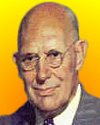
Charles Kettering (1876-1958) was an American engineer who held 140 patents for his many inventions. As vice president and director of research for General Motors Corp. (1920-47) he developed engines, quick-drying lacquer finishes, anti-knock fuels, and variable-speed transmissions. He provided intermission talks during the radio program General Motors Symphony of the Air. A collection of his scripts (1942-45) are on this site, with an index of Short Stories and Science and Invention. Although some are dated, they remain of historical interest, and together, it is interesting to know how the listeners could tune in to intelligent radio programs in that era, and how a prolific inventor could communicate with the general public.

On 25 Nov 1958, Charles Kettering died, a prolific American inventor. His patents include the electric starter, car lighting and ignition systems. In his early career, he created the first cash register with an electric motor that opened the drawer. Today's book pick is: Charles F. Kettering: A Biography, by Thomas Alvin Boyd, who as an associate of “Boss Ket” for 35 years is well-qualified to write this life story. A new reader, starting out ignorant of Kettering's accomplishments will find out why is his time, he was deservedly highly respected for his important innovations in the automotive industry. This is an engrossing story of the great inventor as a man and his philosophy. You may find it eye-opening to find how his inventions now affect our current life.
It is available from Amazon, typically about New from $34.95. Used from $27.94. (As of earlier time of writing - subject to change.)
| no image | Science is not, as so many seem to think, something apart, which has to do with telescopes, retorts, and test-tubes, and especially with nasty smells, but it is a way of searching out by observation, trial and classification; whether the phenomena investigated be the outcome of human activities, or of the more direct workings of nature's laws. Its methods admit of nothing untidy or slip-shod; its keynote is accuracy and its goal is truth. |
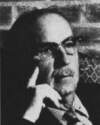 | Being the inventor of sex would seem to be a sufficient distinction for a creature just barely large enough to be seen by the naked eye. [Comment about Volvox, a freshwater green algae, which appears indetermimately plantlike and animal-like during its reproductive cycle.] |
 | Science is founded on uncertainty. Each time we learn something new and surprising, the astonishment comes with the realization that we were wrong before. |
| Before you look at today's web page, see if you can answer some of these questions about the events that happened on this day. Some of the names are very familiar. Others will likely stump you. Tickle your curiosity with these questions, then check your answers on today's web page. | |
| Births | |
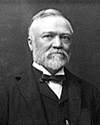 | Andrew Carnegie, born 25 Nov 1835 was a Scottish-born American industrialist who made a fortune from that career, then spent the later years of his life devoted to philanthropy. He was a benefactor of over 1700 libraries. He made his fortune in what industry? |
| Deaths | |
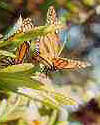 | Kenneth C. Brugger (1918-1998) was an American amateur naturalist who discovered the long-sought winter home of a migrating butterflies which travelled from the U.S. to their butterfly refuge within the territory of only 200 square meters in central Mexico. He traced the migration of which butterfly? |
| Events | |
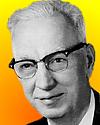 | On 25 Nov of a certain year, cable television was invented by Ed Parsons. On Thanksgiving Day, his family watched KRSC’s inaugural broadcast, although the TV station was 150 miles away in Seattle. He had set up an antenna on top of the hotel where he lived. He strung a cable from it to his living room. When he installed a set in the hotel lobby, other people saw the programs and asked for a hookup to his high antenna. In which decade was this first use of cable television? |
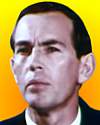 | On 25 Jan of a certain year, Dr. Christian Barnard transplanted the first human heart without the removal of the old one. In which decade did this transplant take place? |
Fast answers for the previous newsletter for November 24: W and Z particles • parity conservation during interaction of subatomic particles • Maxim machine gun • decade containing the year 1874 • Wilbur and Orville • The Origin of Species by Means of Natural Selection.
 If you enjoy this newsletter, the website, or wish to offer encouragement or ideas, please send feedback by using your mail reader Reply button.
If you enjoy this newsletter, the website, or wish to offer encouragement or ideas, please send feedback by using your mail reader Reply button. Your click on a Facebook, StumbleUpon, or other social button on the site webpages is also a welcome sign of appreciation. Thank you for using them.
© This newsletter is copyright 2020 by todayinsci.com. Please respect the Webmaster's wishes and do not put copies online of the Newsletter — or any Today in Science History webpage. (If you already have done so, please remove them. Thank you.) Offline use in education is encouraged such as a printout on a bulletin board, or projected for classroom viewing. Online, descriptive links to our pages are welcomed, as these will provide a reader with the most recent revisions, additions and/or corrections of a webpage. For any other copyright questions, please contact the Webmaster by using your mail reader Reply button.
--
If you do not want to receive any more newsletters, Unsubscribe
To update your preferences and to unsubscribe visit this link
Executive Real Estate Business Class
-
"It was like a man with wings. It wasn't like anything you'd see on TV or in a monster movie." ...
About the publisher
Search This Blog
Blog Archive
-
▼
2020
(1542)
-
▼
November
(164)
- Last day to save! Take advantage of Black Friday d...
- On This Day for November 30 - Independence of Barb...
- Newsletter for Monday 30 November.
- November 30: Cnut the Great, the 1st State to Abol...
- FAMILY: Happiness in a stressful season
- Medieval monarchs | WW1 quiz | Marlborough pie recipe
- On This Day for November 29 - United Nations resol...
- Newsletter for Sunday 29 November.
- November 29: Edison's Phonograph, Schrödinger's Ca...
- The Compass: Italy
- See the past through a different lens with Nat Geo...
- On This Day for November 28 - Opening of Tehrān Co...
- Newsletter for Saturday 28 November.
- November 28: Exploration, Invention and a Day of F...
- PHOTOGRAPHY: How adversity inspired discovery for ...
- The gift of curiosity lasts a lifetime. Give Nat G...
- Very Weird — And Very Real — Facts About The Victo...
- Black Friday Deals: Save 50% on a Britannica Membe...
- Black Friday Savings at the HISTORY Store
- On This Day for November 27 - Nobel Prizes establi...
- Newsletter for Friday 27 November.
- November 27: The Model Parliament, the 1st Native ...
- ANIMALS: The pets I’m thankful for
- A Very Special Thanksgiving Edition Of Our Newsletter
- On This Day for November 26 - Premiere of Casablan...
- Newsletter for Thursday 26 November.
- YOUR WEEKLY ESCAPE: They live in a legendary under...
- November 26: 1st National Thanksgiving, Alice in W...
- SCIENCE: The prehistoric truth about turkeys
- UPDATED: Every Membership Now 50% Off!
- Every Membership Now 50% Off!
- Demystified: Is the Ozone Layer Finally Healing It...
- On This Day for November 25 - Japanese military ba...
- Newsletter for Wednesday 25 November.
- November 25: Dynamite and The Mousetrap
- TRAVEL: Keeping your family safe over the holidays
- Meet The Real-Life "Dexter" — Serial Killer Of Mur...
- On This Day for November 24 - Dutch discovery of T...
- Newsletter for Tuesday 24 November.
- November 24: 1st Transit of Venus Observed, Van Di...
- HISTORY: The faces of COVID-19’s toll
- New This Week on History News Network
- On This Day for November 23 - Ley Juárez passed, I...
- Newsletter for Monday 23 November.
- November 23: On This Day in History
- FAMILY: Keeping the holidays familiar for your kids
- The many faces of Anne Boleyn | Take our Tudors qu...
- On This Day for November 22 - U.S. President John ...
- Newsletter for Sunday 22 November.
- November 22: Vasco da Gama Rounds the Cape and JFK...
- The Compass: Hawaii
- On This Day for November 21 - Signing of Mayflower...
- Newsletter for Saturday 21 November.
- November 21: The Mayflower Compact, a Jewish state...
- CORONAVIRUS UPDATE: 200,000 new cases in a single day
- PHOTOGRAPHY: Switching tactics to chronicle the wo...
- How The Kennedy Curse Has Tormented America's Firs...
- On This Day for November 20 - Mexican Revolution l...
- The Roundup Top Ten for November 20, 2020
- Newsletter for Friday 20 November.
- November 20: Uyghurs Conquer China, the Napoleonic...
- ANIMALS: The deadly thing about snakes
- Give your kids a love of learning with Nat Geo Kid...
- #1 Gift for Families this Holiday - On Sale Now!
- On This Day for November 19 - Anwar Sadat's visit ...
- Newsletter for Thursday 19 November.
- November 19: "Four Score and Seven Years Ago..."
- YOUR WEEKLY ESCAPE: Not all of the dinosaurs died
- SCIENCE: Can we make North America’s greatest reso...
- The Latest News from History News Network
- On This Day for November 18 - Jonestown massacre, ...
- Newsletter for Wednesday 18 November.
- November 18: St. Peter's Basilica is Consecrated a...
- TRAVEL: Best of the World 2021
- Black Friday Early Access! 50% off Holiday Bundles...
- Photographer Captures the Impacts of Climate Chang...
- On This Day for November 17 - Arnold Schwarzenegge...
- Newsletter for Tuesday 17 November.
- November 17: On This Day in History
- HISTORY: Thanksgiving in tough times
- New This Week on History News Network
- On This Day for November 16 - Election of Bhutto a...
- Newsletter for Monday 16 November.
- November 16: Francisco Pizarro Ambushes Atahualpa,...
- FAMILY: Keeping kids kind during this stressful time
- The Crown S4 | Henry VIII's seventh wife | Vikings...
- On This Day for November 15 - Palestinian statehoo...
- Newsletter for Sunday 15 November.
- November 15: The Scramble for Africa and the Vietn...
- The Compass: Peru
- On This Day for November 14 - Eritrea made a provi...
- Newsletter for Saturday 14 November.
- CORONAVIRUS UPDATE: The U.S. enters uncharted terr...
- November 14: Kirch's Comet, Einstein's Theory of L...
- PHOTOGRAPHY: In the land of Arctic dreams
- The Unhinged Soldier Who Avenged Lincoln's Assassi...
- The Roundup Top Ten for November 13, 2020
- On This Day for November 13 - Terrorist attacks in...
- Newsletter for Friday 13 November.
- ANIMALS: Images to surprise and delight during thi...
-
▼
November
(164)
-
Blogroll
-
About
HistoryFact










0 comments:
Post a Comment